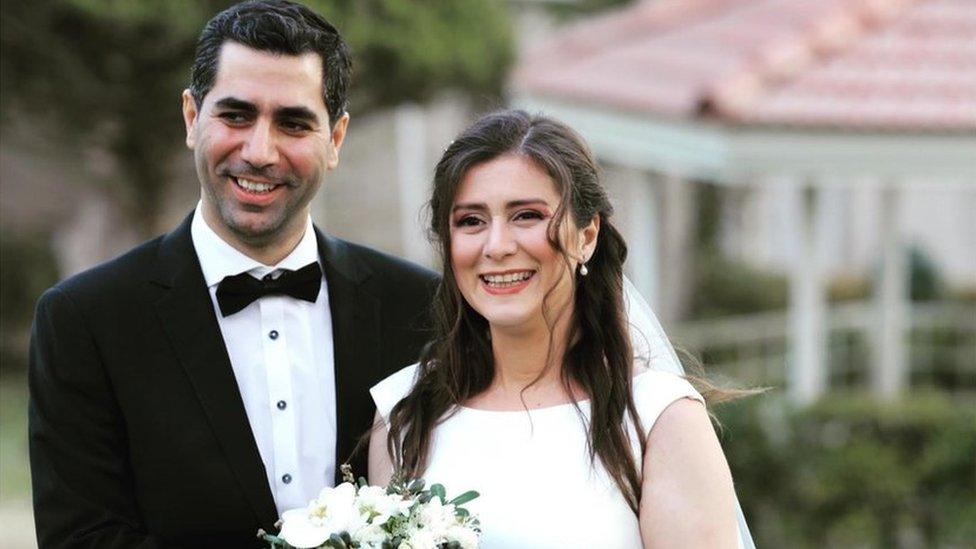Iran plane downing: Canadian PM promises 'justice' at memorial
- Published
"We need full clarity on how such a horrific tragedy could have occurred"
Canadian Prime Minister Justin Trudeau has said he will seek "justice" for those killed on board a Ukrainian passenger plane downed by Iran.
Mr Trudeau spoke in Edmonton, Alberta at a vigil for the 57 Canadians killed in the disaster.
The PM promised to pursue answers from Iran, which admitted its military shot down the plane in error, killing all 176 people on board.
Iran had previously rejected suggestions that it was to blame.
"This tragedy should have never occurred, and I want to assure you that you have my full support during this extraordinarily difficult time ... you give us purpose to pursue justice and accountability for you," said Mr Trudeau, addressing a crowd of 2,300 people in a university gym.
"We will not rest until there are answers."
Mr Trudeau attended the memorial on Sunday, as a second day of anti-government protests against Iran's leaders erupted.
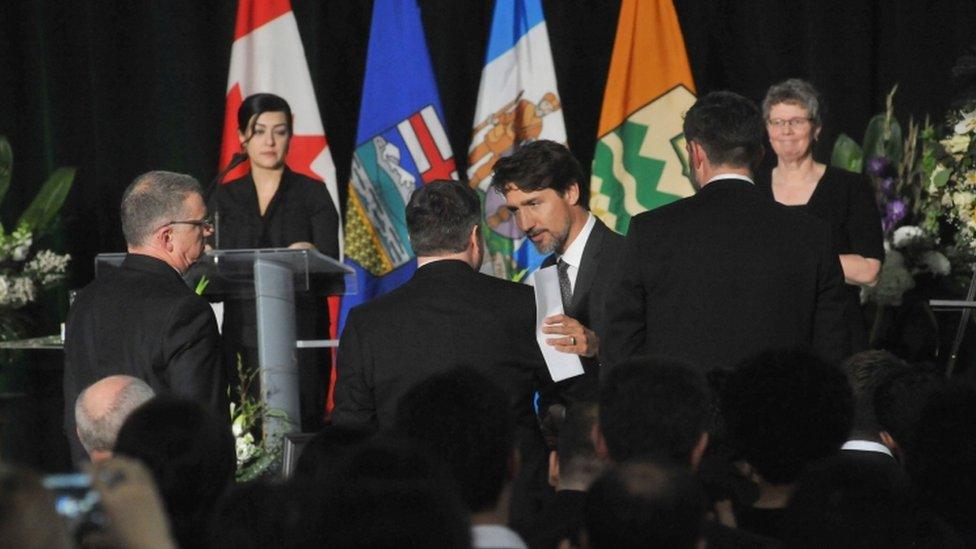
Justin Trudeau said "we will not rest until there are answers"
Iran's belated admission that it "unintentionally" hit the Boeing plane with missiles has caused outrage at home and abroad.
At protests in Tehran and other cities, there were chants against the leadership and reports of clashes with security forces, which fired tear gas.
The plane, en route to the Ukrainian capital, Kyiv, was shot down near Tehran last Wednesday, shortly after Iran had launched missiles at two airbases housing US forces in Iraq.
Those strikes were a response to the US killing of senior Iranian commander Qasem Soleimani in a drone strike in Baghdad on 3 January.
Dozens of Iranians and Canadians, as well as nationals from Ukraine, the UK, Afghanistan and Sweden died on the plane.
Iran has invited Canada, Ukraine and Boeing to take part in an investigation into the disaster. Those responsible, Iran says, will be held accountable and prosecuted.

At the scene: Canada mourns
BBC's Jessica Murphy, Edmonton, Alberta
Pedram Mousavi and Mojgan Daneshmand gazed out from the photograph projected on the screen with wide smiles, looking like they had been caught laughing at a shared joke.
The "sweet couple" likely were.
Along with their two daughters, Daria, 14, and Dorina, 9, they were remembered for their quickness to laughter, their generosity, their full embrace of life.
Pedram Mousavi, Mojgan Daneshmand, and their two daughters were all passengers on flight PS752
The family of four were among the 13 victims of flight PS752 who came from the Canadian city of Edmonton.
A crowd of some 2,300 people packed into a university gym on Sunday to pay respects to those lost - family, close friends, colleagues, classmates - whose deaths have left a hole in so many lives.
Prime Minister Trudeau told the crowd that in their sorrow "your entire country stands with you".
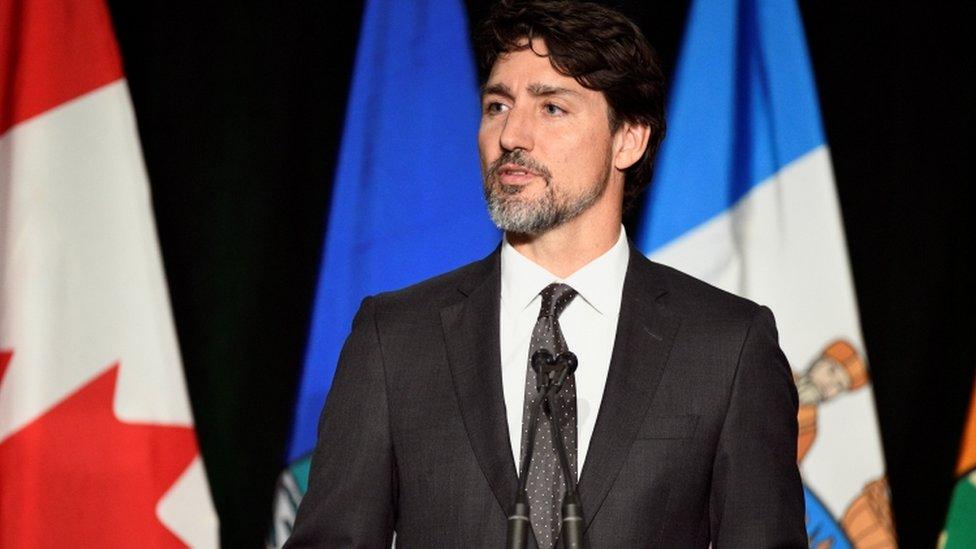
Mr Trudeau promised to pursue answers from Iran
A friend of Pedram's, through a letter read by his former student Hossein Saghlatoon, said the loss was "too much to bear".
He was looking forward to many more memorable moments with Pedram and his family, he wrote, "but alas, the cruel hand of destiny had some other plans".

What happened at Sunday's protests in Tehran?
After a wave of anti-government protests on Saturday, demonstrators returned to the streets despite a large deployment of security forces.
Riot police, members of the elite Revolutionary Guard on motorbikes, and plainclothes security officials were out in force.
In one apparently symbolic act rejecting state propaganda, video showed students taking care not to walk over US and Israeli flags painted on the ground at Shahid Beheshti university in Tehran.
In some social media clips, protesters can be heard chanting anti-government slogans, including: "They are lying that our enemy is America, our enemy is right here." Many of the protesters are women.
A crowd gathered outside Amir Kabir university on Saturday, calling for resignations and accusing officials of lying
What has the international reaction been?
US President Donald Trump on Sunday repeated warnings that Iran should not target anti-government protesters, saying, "the World is watching. More importantly, the USA is watching".
In a later tweet, Mr Trump said he "couldn't care less" if Iran wants to negotiate, adding it will be "totally up to them but, no nuclear weapons".
Allow X content?
This article contains content provided by X. We ask for your permission before anything is loaded, as they may be using cookies and other technologies. You may want to read X’s cookie policy, external and privacy policy, external before accepting. To view this content choose ‘accept and continue’.

Britain, meanwhile, has condemned the arrest of the UK ambassador to Iran in Tehran as a "flagrant violation of international law".
Foreign Secretary Dominic Raab said Rob Macaire was detained on Saturday after attending a vigil where he was paying respects to victims of the crash, some of whom were British.
Mr Macaire said he left the vigil when some people started chanting and had played no part in the demonstration.
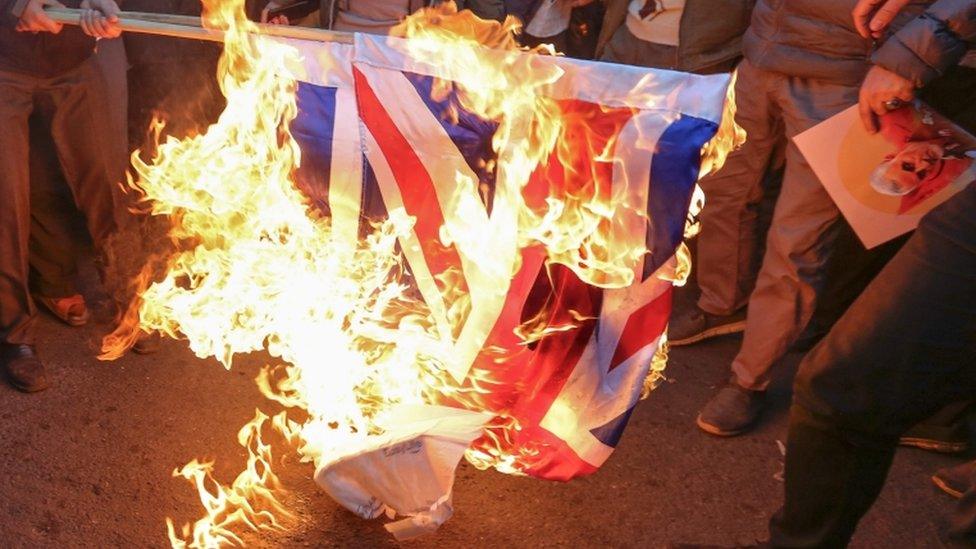
Protesters burn a UK and an Israeli flag in Tehran
Iran on Sunday summoned the ambassador to complain about "his unconventional behaviour of attending an illegal rally", the foreign ministry website said.
Iranian protesters set a UK flag alight in front of the UK embassy on Sunday.
How did the Iranian admission unfold?
For three days, Iran denied reports its missiles had brought down the plane, with one spokesman accusing Western nations of "lying and engaging in psychological warfare".
But on Saturday morning, a statement read on state TV accepted the plane had been shot down.
Brig-Gen Amir Ali Hajizadeh, the Revolutionary Guards' aerospace commander, said a missile operator had acted independently and alone, mistaking the plane for a "cruise missile".
Footage shows missile strike on Ukrainian plane in Iran
He also said he had informed the authorities about what had happened on Wednesday, raising questions about why Iran had denied involvement for so long.
Both Ukrainian President Volodomyr Zelensky and Justin Trudeau have demanded accountability from Iran.
Mr Trudeau said on Saturday there must be a full investigation with "full clarity on how such a horrific tragedy could have occurred".
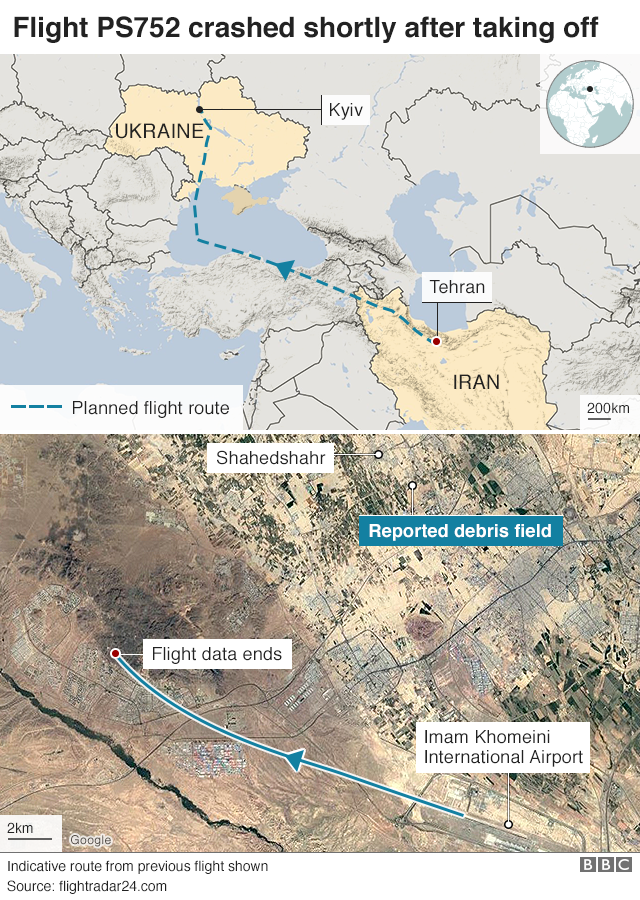

- Published12 January 2020
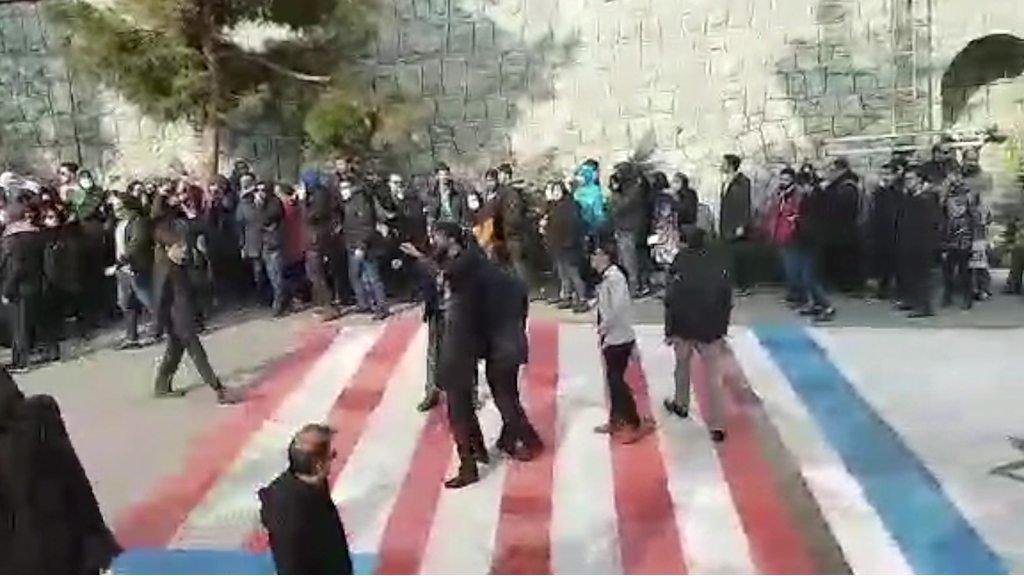
- Published12 January 2020
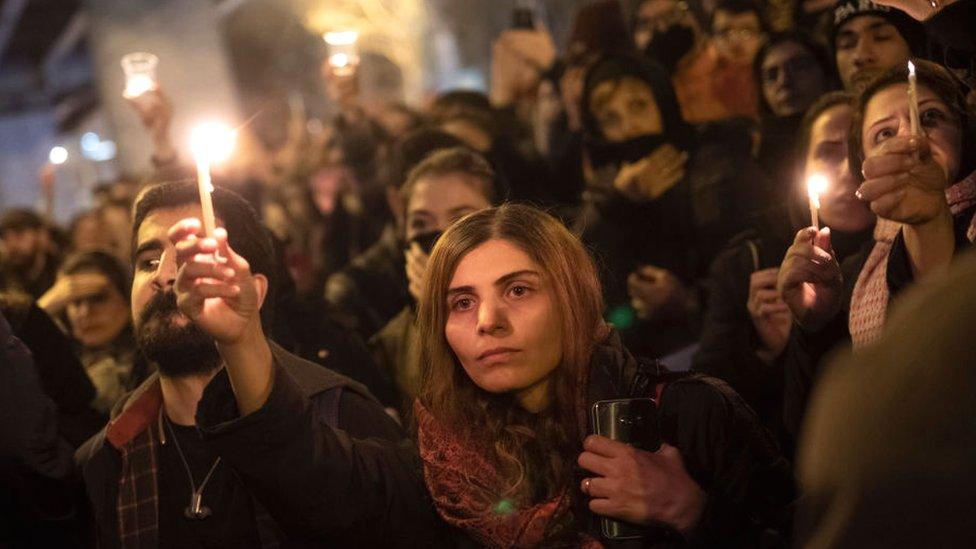
- Published14 January 2020
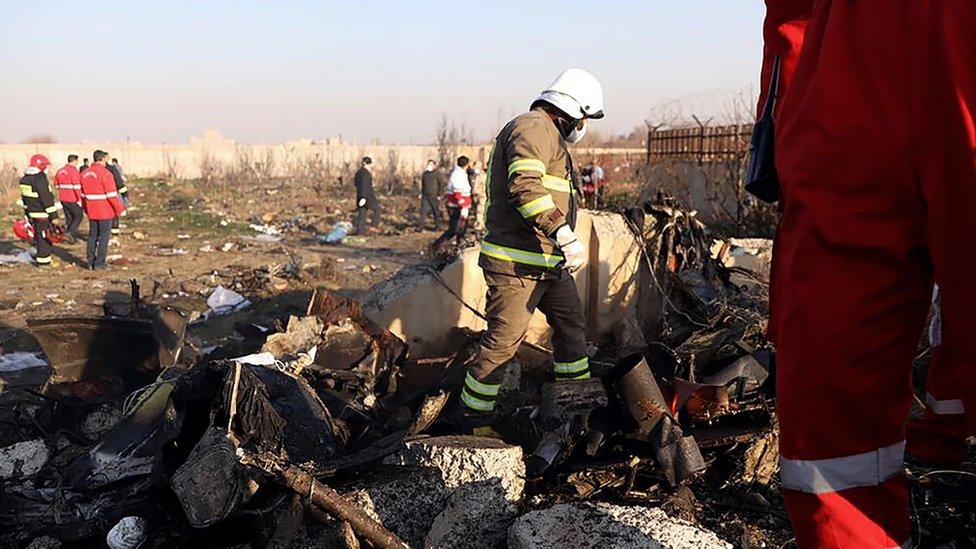
- Published11 January 2020
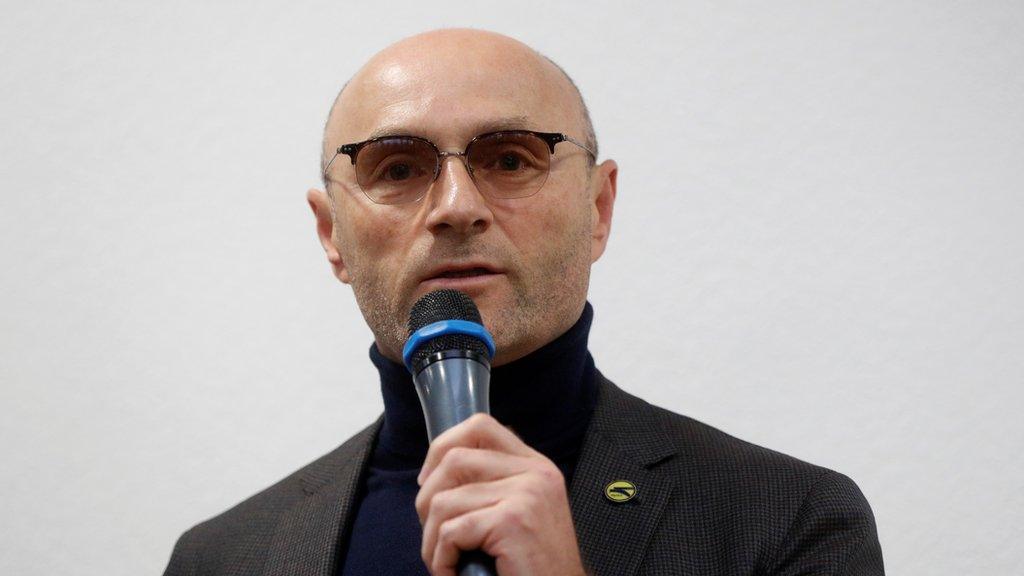
- Published9 January 2020
